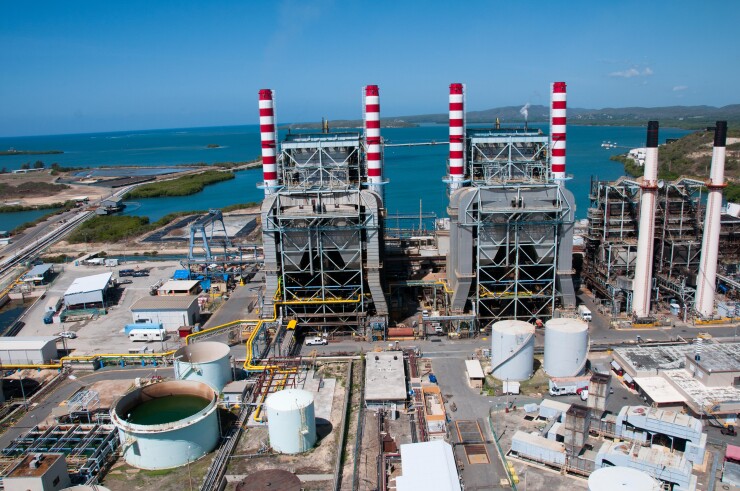The Puerto Rico Oversight Board's proposed Puerto Rico Electric Power Authority plan of adjustment is in the hands of U.S. District Court Judge Laura Taylor Swain, while some observers expect an appeals court to overturn rulings underlying the plan, which would force a revision.
After final oral arguments were made Monday, Swain said she would release her ruling later.
The current proposed plan

Meanwhile, the First Circuit Court of Appeals is likely
Wilk Auslander Partner Jay Auslander last week said an appeals court would likely overturn a bond party appeal of Swain's ruling severely limiting their lien, an observation which Puerto Rico Clearinghouse Principal Cate Long agreed with.
The trust agreement's "pledge of revenues" to bondholders and how Swain's ruling would dramatically impact the municipal market should lead to a reversal, Auslander said.
An overturn would force revision to the plan of adjustment in a manner more favorable to the bond parties, he said.
If the appeals court rules in favor of the bond parties before a plan goes into effect, the plan will be "unconfirmable," Auslander said, and it could take months to come up with a valid plan.
However, if the appeals court were to reverse the plan after Swain approves it, the bond parties could launch a challenge.
But the case is likely to then be appealed to the U.S. Supreme Court, Auslander said, although he doesn't expect the high court to hear it.
Besides the "pledge of revenues," which the appeals court should interpret as having given bondholders a lien because "pledge" and "lien" were used interchangeably in legal documents when the bond indenture was written, the bondholders' lien on the revenue in the sinking fund is said to be "in addition to" other security, Auslander said.
Also, interpreting the bondholders' lien as being restricted to only the money in the sinking fund would be "enormously problematic" for the bond market, he added.
If Swain's decision were to stand, it would undermine precedent and lead to widespread disruption in the bond market, Auslander added.
The proposed plan of adjustment offers other issues the appeals court may use to strike it down, Auslander said.
While the bond parties' appeal did not
PREPA Ad Hoc Group attorney G. Eric Brunstad, Jr., said board attorney Martin Bienenstock provided no precedent for disparate treatment of the same creditor claim.
"Because we have a clear case of a checkerboard plan here as egregious as one has ever been proposed, the plan cannot be confirmed," Brunstad said.
Assured Guaranty attorney Sean O'Shea said under the Puerto Rico Oversight, Management, and Economic Stability Act, PREPA is required to give bond parties the most it can afford, and the plan doesn't.
The board consistently tried to pay less by reducing the available revenue through its affordability analysis, O'Shea said. The analysis was "designed to reach a preordained result."
He said the two contingent vehicle instruments offered are "all but worthless" and would pay very little, if anything.
While the board's offer is based on projections of 23 years of economic decline, the Puerto Rico Fiscal Agency and Financial Advisory Authority, is using projections of growth when speaking to ratings agencies, PREPA Ad Hoc Group attorney Michael Doluisio said.
GoldenTree and Syncora attorney Glen Kurtz noted the island showed economic growth in each of the five past years.
Arguing for the board's plan, Bienenstock said bondholders were seeking to increase electricity rates by 21%, which would lead to increased emigration from Puerto Rico, energy theft, and conversion to solar electricity, all reducing the consumption that PREPA relies on for revenues.
Puerto Rico electric rates are already 75% over average rates in the 50 states, Bienenstock said.
Bienenstock said similar holdings can be placed in different classes with different treatments when there is justification for doing so, and it has been in other bankruptcy cases.
"The evidence has … shown the board's model works a delicate balance between competing interests and constituents, is a result of unbiased and collaborative work among experts and advisors and thoughtful and careful analysis and judgment, is grounded in fundamental principles including the price elasticity of demand, the costs of service proportionality, and just and reasonable rates, and was developed [for] most revenue to pay back legacy debt while protecting PREPA and its customers," said board attorney Margaret Dale.
Attorneys for environmental groups, PREPA's main union, and a group of private-sector parties argued against the plan, saying it was too generous to creditors, thereby hurting Puerto Rico consumers and leaving the authority short of funds for repairing facilities.
Attorney Rafael Ortiz, speaking for the PREPA retirement system, made a similar argument but added the board's treatment was unfair, not in good faith, and contained errors. He said the board rejected special allocations without meeting the standards for rejection.
Puerto Rico residents also have made "it known" that their lives will be greatly affected by the decision, Swain said in the closing session, adding she said would keep them in mind. During a recent session, many Puerto Rico residents spoke against the plan, saying was being too generous to creditors.





